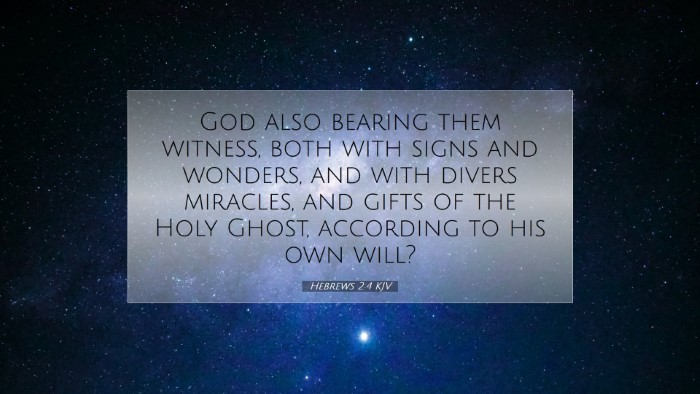Old Testament
Genesis Exodus Leviticus Numbers Deuteronomy Joshua Judges Ruth 1 Samuel 2 Samuel 1 Kings 2 Kings 1 Chronicles 2 Chronicles Ezra Nehemiah Esther Job Psalms Proverbs Ecclesiastes Song of Solomon Isaiah Jeremiah Lamentations Ezekiel Daniel Hosea Joel Amos Obadiah Jonah Micah Nahum Habakkuk Zephaniah Haggai Zechariah MalachiHebrews 2:4
Hebrews 2:4 KJV
God also bearing them witness, both with signs and wonders, and with divers miracles, and gifts of the Holy Ghost, according to his own will?
Hebrews 2:4 Bible Commentary
Commentary on Hebrews 2:4
The verse Hebrews 2:4 states:
"God also bearing them witness, both with signs and wonders, and with divers miracles, and gifts of the Holy Ghost, according to his own will."
Introduction
This verse serves as a crucial element in the understanding of God's confirmation of the message of salvation through Christ. The writer of Hebrews emphasizes that the signs and wonders performed were not merely incidental but were witnessed and authorized by God himself. This commentary seeks to unpack the theological implications and significances of this verse, drawing insights from renowned public domain commentaries by Matthew Henry, Albert Barnes, and Adam Clarke.
The Context of Hebrews
The Epistle to the Hebrews is addressed to a group that is being tempted to revert to old covenant customs and practices. The author’s purpose is to present the superiority of Christ and the New Covenant over the old one. Hebrews 2:4 is part of a larger argument about the authority and authenticity of the Christian message, emphasizing how God has actively confirmed this message through supernatural means.
God Bearing Witness
Matthew Henry notes that the phrase "God also bearing them witness" implies a profound endorsement of the apostles’ message. This is not merely a passive acknowledgment but a dynamic engagement where God actively confirms His word through various means.
Albert Barnes supports this idea by stating that God’s witness is both attesting and supportive. The miracles serve not only as acts of divine power but also as evidence of the truth of divine revelation. These acts compel believers towards faith and offer undeniable testimony to the divine inspiration of the Gospel.
Signs and Wonders
In examining "signs and wonders," Adam Clarke delineates the distinct functions of these phenomena. "Signs" often refer to events that signify deeper spiritual truths while "wonders" evoke astonishment and draw attention to God's presence and action. Clarke elucidates that these miracles served to validate the message of the Gospel and enhance the credibility of the apostles as bearers of divine truth.
Matthew Henry elaborates that these signs were not arbitrary; rather, they were a necessary demonstration of God’s power to substantiate the gospel message’s authority. Thus, they served as divine credentials for the apostles, highlighting the seriousness of their mission.
Diverse Miracles
The mention of "divers miracles" indicates the variety and breadth of God's miraculous works. Albert Barnes emphasizes that the diversity points to the multifaceted nature of God’s interaction with humanity. It reflects God's willingness and ability to engage with His creation in various ways, catering to the needs and contexts of His people.
This diversity underscores the idea that God’s redemptive work is not monolithic but is rich, varied, and tailored to meet different circumstances as people encountered the gospel message.
Gifts of the Holy Ghost
The phrase "gifts of the Holy Ghost" indicates the empowering presence of the Holy Spirit in the life of the believer and in the apostolic mission. Adam Clarke clarifies that these gifts were manifestations of divine grace that served specific purposes within the Church. The spiritual gifts discussed here are equipped by God to enhance the faculties of believers in promoting the gospel and ministering to others.
Matthew Henry remarks that these gifts must be understood as both a privilege and a responsibility. The Holy Spirit equips believers for service, and this endowment further confirms the legitimacy of the message they proclaim.
According to His Own Will
Matthew Henry emphasizes the sovereignty of God in the distribution of miracles and spiritual gifts. The phrase "according to his own will" signifies that God’s actions are purposeful and intentional. His choice to validate the gospel message through signs, wonders, and gifts is rooted in His divine wisdom and sovereign plan for redemption.
Albert Barnes notes that understanding the will of God in this matter invites believers to recognize that their calling and gifting is not random. Each miracle and gift was strategically assigned to fulfill God's larger plan of salvation and witness to His power.
Theological Implications
This verse invites believers, pastors, and theologians to reflect on the legitimacy of their faith. The signs and wonders serve as historical underpinnings of the credibility of the New Testament message and constitute a foundation for apologetics. Faith, grounded in the context of meticulous divine validation, encourages believers to engage deeply with their heritage of faith.
The active participation of the Holy Spirit in the lives of believers today echoes the sentiments expressed in this passage, affirming that God continues to bear witness to His truth amongst His people.
Conclusion
In summary, Hebrews 2:4 encapsulates a powerful testimony of God's decisive involvement in human history through signs, wonders, and gifts. The commentary from distinguished scholars reinforces the continued relevance of this verse in understanding the divine affirmation of the gospel, underscoring a rich legacy that speaks into contemporary Christian faith and practice.
As students of the word, the implications of this passage charge us with the responsibility to both appreciate the sanctity of our inherited faith and to actively participate in the continuous work of the Holy Spirit in our lives and ministries.


